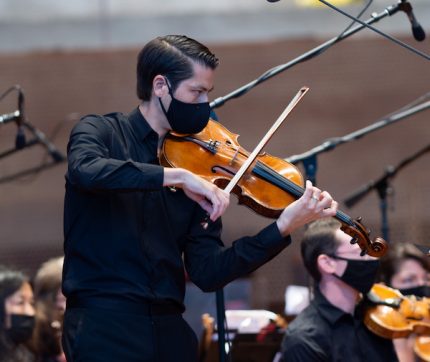Chicago Classical Review »» Kalmar, Grant Park Orchestra did it with Bernstein, Sibelius, and Brouwer
[ad_1]
By Lawrence A. Johnson
The program of the Grant Park Music Festival on Friday evening should include the world premiere of The LES characters by Jessie Montgomery, new Composer in Residence of the Chicago Symphony Orchestra. Unfortunately, the debut of the work has been postponed until next summer. (In a random planning, Montgomery’s banner was performed on the same evening by the CSO in Ravinia.)
Fortunately, Grant Park’s revised program still included the proposed soloist Masumi Per Rostad, who instead performed Margaret Brouwer’s Viola Concerto in the Pritzker Pavilion on Friday night.
Born in Michigan, Brouwer was head of the composition department at the Cleveland Institute of Music for over two decades. Although her music is seldom heard in Chicago, the prolific 80-year-old has built up a significant body of work, including a symphony, several orchestral works, dozen of chamber works and three concerts. The latter includes the Viola Concerto, composed in 2010, which was heard on his Chicago debut.
Cast in the traditional three movements, the opening part (“Caritas”) begins with a brief ominous statement by the orchestra. The soloist steps in and plays an excited solo figure. From the violist follows a melodic secondary theme that grows in intensity. Much of the elongated movement alternates between this material – angular fragments stand in front of lyrical passages, often with unusual instrumentation with bells and chirping bird blowers. A traditional cadenza offers the violist a moment of pyrotechnic performance as he overcomes the jagged music. A new, sweetly lyrical theme arises, played by Rostad with an expressive feeling and emerges in the orchestra in lush opulence on the screen. The glockenspiel returns and the violist ponders inwardly in a passage supported by a solo harp.
The second movement (“beautiful as the moon, bright as the sun”) offers a spring-like main theme as the pace accelerates to another lyrical flowering and cadence. The finale (“Blithesome spiritâ€) begins with sharp single notes from the violist and again puts passionate music and jagged fragments for soloists against short echoes of the earlier lyrical moments, here in a more formulaic way.
Brouwer’s style is tonal and attractive, and her melodic writing style is easy on the ear. There are moments of inspiration, but in the end her viola concerto is not convincing. The composer fails to work out some interesting ideas in a musically convincing manner, and the piece is structurally unwieldy, with the finale being particularly short of worthy material.
The problems of the concert were not to blame for the soloist of the evening, Masumi Per Rostad. The violist, former long-time member of the Pacifica Quartet, emphatically represented this uneven score, played with an evenly polished tone, brought a ripe romantic sensitivity to the rising sides and tackled all difficulties with perfect technical ease. Kalmar and the orchestra were comparable partners who gave each other excellent and committed support.
After a somewhat uneven first two weeks, the opening work Friday became clear – the three dance episodes from Leonard Bernsteins In the city-that Kalmar and the Grant Park Orchestra were making their progress this summer. The brass players were moved onto the stage by the choir poles to join their peers, and the entire ensemble sounded more cohesive and mixed, playing with their usual fire and brilliance.
Kalmar led grandiose performances of the outer dances and evoked a beautiful nocturnal melancholy in “Lonely Town”. The finale of “Times Square: 1944” was particularly lively and richly characterized by solos full of personality, including a curved clarinet and a wonderfully sleazoid saxophone.
Jean Sibelius’ music – permeated with captivating drama and Nordic evocation – is so natural for outdoor concerts that you don’t come across it more often at summer festivals. This program remedied the situation by closing with the Finnish composer’s Symphony No. 5.
In many ways, the Fifth represents Sibelius at its peak with music that is austere but somberly lyrical and elemental in power. Unusually for him, Sibelius struggled with the work, reworked many parts and finally telescoped the original four movements into three. Yet the extensive creative process is not visible in music, which seems to move with a seamless sense of inevitability in an enormously inclusive musical narrative.
The first bars could have been more atmospheric and focused, but after that Kalmar led a flowing, organic performance that highlighted the restless drama of this music. This performance was especially good at illuminating Sibelius’s unique line-up – like the scurrying strings over a brooding solo bassoon. Intermittent light rain added a fourth wall to the turbulent musical landscape that unfolded on the stage.
Kalmar and the GPO players have nicely mapped the changing terrain of the slow movement – while the waltz-like main theme transitions from the delicacy of the string pizzicatos to a rich bloom and ultimately leads to an off-center discomfort when the subject gets out of hand.
The finale felt like a work in progress on Friday evening, with the peppy horn theme strangely underpowered and / or undermicrophones, the horns almost inaudible on their first appearance. Other than that, Kalmar took a subtly calibrated measurement that didn’t play off the gallery (or lawn) in any way. The conductor steadily built up the tension right up to the glowing final section and the six widely spaced chords sealed the performance with emphatic power and granitic weight.
The program will be repeated on Saturday at 6.30 p.m. Grantparkmusicfestival.com
Posted in Performances
Leave a comment
[ad_2]

